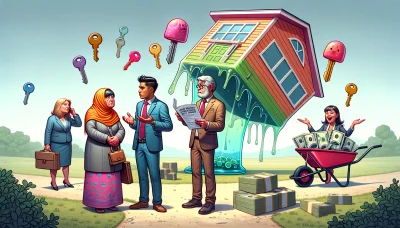First time home buyer down payment Quiz
Test Your Knowledge
Question of
Understanding Down Payments for First-Time Home Buyers
The Basics of Down Payments
A down payment is the initial, upfront portion of the total purchase price that you pay when buying a home. This sum directly influences your mortgage amount and is a critical factor in securing your dream property. It's essential to understand that the larger your down payment, the less you'll need to borrow, leading to lower monthly payments.
Not only does a substantial down payment reduce your loan amount, but it also builds instant equity in your home. This acts as a financial safety net and could be advantageous if market conditions fluctuate. Planning for this initial investment is a cornerstone of responsible homeownership.
Minimum Down Payment Requirements
Minimum down payment requirements vary based on loan type and lender policies. Conventional loans typically require at least 5% down, while government-backed options like FHA loans may accept as little as 3.5%. It's paramount to research and understand the criteria specific to your chosen loan type.
Veterans may qualify for VA loans with no down payment requirement, offering exceptional value for those who have served. Always consult with a mortgage advisor to get the most accurate information tailored to your circumstances.
How Down Payments Affect Mortgage Rates and Terms
A higher down payment often results in more favorable mortgage rates and terms. Lenders see borrowers with significant down payments as lower risk, which can translate into cost savings over the life of the loan. It's imperative to consider how different down payment levels might impact your long-term financial goals.
Remember that putting at least 20% down typically eliminates the need for Private Mortgage Insurance (PMI), an additional monthly expense designed to protect lenders against default. This can lead to significant savings over time, making it an important consideration when determining your ideal down payment amount.
Saving Strategies for Your First Home Purchase
Budgeting Tips for Aspiring Homeowners
- Analyze Current Spending: Scrutinize your current expenses and identify areas where you can cut back. Every dollar saved brings you closer to your goal.
- Automate Savings: Set up automatic transfers to a dedicated house fund. This ensures consistent savings without the temptation to spend elsewhere.
- Reduce High-Interest Debt: Pay off high-interest debts like credit cards. This will free up more money for saving and improve your debt-to-income ratio.
- Increase Income Streams: Consider side gigs or overtime work to boost your income specifically for your home fund.
- Downsize Current Living Situation: If possible, move into a smaller or less expensive place temporarily to accelerate savings.
- Save Windfalls: Commit any unexpected windfalls such as tax refunds or bonuses directly into your home savings account.
High-Yield Savings Accounts and Investment Options
To maximize your savings efforts, consider opening a high-yield savings account specifically designated for your future home purchase. These accounts offer higher interest rates compared to traditional savings accounts, which means your money grows faster over time without any additional risk.
If you have a longer timeline before purchasing, exploring low-risk investment options could potentially yield higher returns than regular savings accounts. However, always consult with a financial advisor before investing to ensure alignment with your risk tolerance and time horizon.
Exploring Government-Backed Loan Options
FHA Loans: A Gateway for First-Time Buyers
FHA loans are a sensational choice for first-time homebuyers, offering lower down payments and more lenient credit requirements. They're the key to unlocking homeownership for many who may not qualify for conventional loans. These loans are backed by the Federal Housing Administration, which reduces lender risk and encourages them to offer favorable terms.
With the FHA's backing, borrowers can access competitive interest rates and potentially save a fortune over the life of their loan. It's an opportunity too good to miss! These loans have propelled countless individuals into their dream homes, with the added security that government backing provides.
Eligibility Criteria for FHA Loans
Qualifying for an FHA loan is straightforward, with clear criteria that open doors for many prospective buyers. Applicants need a steady income, a reasonable debt-to-income ratio, and a minimum credit score that's more forgiving than most conventional loans. This inclusive approach is what makes FHA loans so accessible!
An important point to note is that FHA loans require mortgage insurance premiums (MIP), both upfront and annually. This insurance protects lenders in case of borrower default but adds to the overall cost of the loan. Still, this small hurdle is often worth it for the incredible opportunity that FHA loans provide.
Pros and Cons of Opting for an FHA Loan
- Pros: Lower down payment requirements open up homeownership to more people.
- Pros: More relaxed credit score criteria mean that past financial missteps won't necessarily hold you back.
- Cons: Mandatory mortgage insurance premiums can add up over time, increasing the cost of borrowing.
- Cons: There are limits on how much you can borrow, which might restrict your housing options in certain markets.
Other Government Programs to Assist Home Buyers
Beyond FHA loans, there are other government programs designed to make homeownership accessible. Each program has unique features tailored to serve different segments of the population. These programs not only facilitate home buying but also contribute to economic stability by promoting property ownership.
If you thought FHA loans were your only option, think again! There's a whole world of government-backed loan programs ready to turn your homeownership dreams into reality. Let's dive into some of these incredible options!
VA Loans and Their Benefits for Veterans
Veterans, active-duty service members, and eligible spouses can tap into VA loans' outstanding benefits. With no down payment requirements and no private mortgage insurance needed, VA loans stand out as one of the most beneficial programs available. They're a well-deserved thank you for those who've served our country!
The advantages don't stop there; VA loans come with competitive interest rates and easier qualification standards. They're a powerful tool in a veteran's arsenal when it comes to purchasing a home. It's these features that make VA loans an unparalleled option for those eligible.
USDA Loans for Rural Home Buyers
The USDA loan program is another hidden gem targeting rural and suburban homebuyers. It supports growth in less densely populated areas by offering 100% financingyes, no down payment required! This initiative makes homeownership attainable in communities where it might otherwise be out of reach.
To be eligible, your chosen home must be in an area designated as rural by the USDA, and you must meet certain income requirements. But if you do qualify, it's an extraordinary chance to own a home without the burden of saving for a large down payment. USDA loans are proof positive that great opportunities exist beyond city limits!
Navigating Private Mortgage Insurance (PMI)
The Role of PMI in Home Purchases
Private Mortgage Insurance (PMI) is a safeguard for lenders against the risk of loan default. When you buy a home with less than 20% down, lenders require PMI to protect their investment. It's an additional cost for buyers but enables them to purchase sooner by putting down a smaller amount.
PMI opens doors for those who cannot afford a hefty down payment, allowing them to join the ranks of homeowners. The cost of PMI varies, typically ranging from 0.3% to 1.5% of the original loan amount per year, and is often included in your monthly mortgage payment.
Understanding How PMI Works
Once you reach 20% equity in your home through payments or appreciation, you can request the cancellation of PMI. Lenders are also required to automatically terminate PMI when your mortgage balance falls to 78% of the original purchase price, as long as you're in good standing.
The specific terms and conditions of PMI cancellation can vary based on your loan agreement. Therefore, it's essential to understand your lender's policies and federal regulations to know exactly when and how you can eliminate this extra expense.
Calculating PMI Costs and Duration
To estimate your PMI costs, consider the loan-to-value ratio (LTV), credit score, and insurer. These factors influence the rate at which you'll pay PMI. Generally, higher LTVs and lower credit scores result in higher premiums.
The duration of time you'll be paying PMI depends on the amount of your down payment and the speed at which you pay down your mortgage principal. Some buyers may pay for a few years, while others might take over a decade before reaching that crucial 20% equity threshold.
Strategies to Avoid Paying PMI
A straightforward strategy to bypass PMI is to save for a larger down payment. Accumulating 20% or more means you won't need PMI at all. This not only saves on insurance costs but may also secure more favorable loan terms.
- Opt for a Piggyback Loan: Consider taking out two mortgages simultaneously one for 80% of the homes value and another for the remaining balance minus your down payment.
- Lender Negotiation: Some lenders may waive PMI if you accept a higher interest rate or pay an upfront fee.
- Veteran Benefits: If eligible, VA loans do not require PMI regardless of your down payment size.
- Home Price Appreciation: Monitor your homes value; increasing market prices could push your equity over 20%, allowing you to request early termination of PMI.
Exploring Lender-Paid Mortgage Insurance (LPMI)
Lender-Paid Mortgage Insurance is an alternative where the lender pays your PMI upfront or via a higher interest rate over the life of the loan. While this eliminates monthly PMI fees, it could lead to greater expense over time due to increased interest payments.
When considering LPMI, calculate long-term costs compared to standard PMI options. Sometimes LPMI can be cost-effective if you plan on staying in your home for a shorter period or expect to refinance in the future.
Creative Financing Solutions for Down Payments
Gifted Funds and Their Utilization
In the journey to homeownership, gifted funds can be a lifesaver. They allow potential buyers to cover down payment costs without depleting their own savings. Gifted funds are particularly popular among first-time homebuyers who might find saving for a down payment challenging amidst other financial commitments.
When using gifted funds, it's essential to follow the rules laid out by lenders. These funds must be truly gifts, not loans disguised as gifts, and the benefactor should provide a gift letter stating there is no expectation of repayment. This ensures clarity in the transaction and maintains integrity in the home buying process.
Acceptable Sources of Gifted Funds
Lenders typically require that gifted funds come from acceptable sources. Immediate family members are the most common donors, but relatives, fiancs, or domestic partners may also qualify. It's crucial to consult with your lender to confirm that your source is acceptable and to prepare the necessary documentation.
Beyond individuals, there are entities like charitable organizations or government programs that offer assistance which may be considered as gifted funds. Prospective homeowners should explore these options thoroughly for additional support in their home buying venture.
Tax Implications and Lender Requirements
Understanding tax implications is vital when receiving gifted funds for a down payment. The IRS has guidelines on how much can be given without tax consequences. Therefore, both donors and recipients should be aware of current tax exclusions to avoid any unwelcome surprises during tax season.
Lenders have specific requirements about documenting gifted funds, often requiring a paper trail. This includes bank statements showing the transfer of funds and a gift letter from the donor. Adhering to these requirements ensures smooth processing of your mortgage application.
Exploring Down Payment Assistance Programs
Down payment assistance programs are an incredible resource for homebuyers who need that extra financial push. These programs often come in the form of grants or low-interest loans and can make homeownership accessible even for those with limited savings.
It's important to note that assistance programs sometimes have conditions such as income limits or mandatory homebuyer education courses. However, they remain an invaluable tool for making homeownership achievable for more people.
Local and State Down Payment Assistance
- Research Thoroughly: Investigate local and state programs since options can vary widely by location.
- Understand Eligibility: Each program has unique eligibility criteria such as income levels, property locations, or buyer status (e.g., first-time buyer).
- Prepare Documentation: Have all necessary documents ready; this often includes tax returns, pay stubs, and employment verification.
- Mind the Deadlines: Be aware of application deadlines to ensure you don't miss out on available assistance.
- Educate Yourself: Attend required homebuyer education sessions early to gain valuable information about the purchasing process.
- Consider Long-Term Commitments: Some programs may require you to stay in the home for a certain number of years or repay the assistance if you move too soon.
- Maintain Good Credit: A solid credit score can increase your chances of qualifying for assistance programs.
- Contact Housing Counselors: Seek advice from HUD-approved housing counselors who can guide you through local options.
Nonprofit and Employer-Sponsored Programs
Beyond government initiatives, many nonprofit organizations offer down payment help targeted at specific groups such as veterans or low-to-moderate income buyers. Exploring these specialized programs could uncover less known funding sources tailored to individual needs.
In addition to nonprofits, some employers provide down payment assistance as part of their benefits package. This can be particularly prevalent in sectors like health care or education where attracting talent is competitive. Employees should check with their HR departments about any available housing incentives.
The Impact of Credit Scores on Home Buying
Credit Score Requirements for Mortgages
Navigating the world of home buying can be thrilling, and your credit score is a VIP pass to the best mortgage deals out there! Lenders use this little three-digit number as a snapshot of your financial reliability. If it's high, you're golden - think lower interest rates and more lender love. But if it's low, brace yourself for some hurdles.
It's not all doom and gloom if you're not sporting a top-tier credit score. Some loan programs are designed with you in mind! FHA loans, for instance, are more forgiving and require only a 580 score for that sweet 3.5% down payment deal. Conventional loans typically want a 620 or higher, while jumbo loans might demand scores upward of 700.
Minimum Credit Score Thresholds for Various Loan Types
Each loan dances to the beat of its own drum when it comes to credit score requirements. For example, conventional loans often call for at least a 620, while VA and USDA loans might not set a floor but still prefer scores above 640. Lenders have their criteria, so it's always best to shop around!
How to Improve Your Credit Score Before Applying for a Mortgage
Dreaming of the perfect home? Make sure your credit score isn't snoozing on the job! Start by checking your credit report for errors they're like party crashers at your credit score fiesta. Pay down debts; it's like weightlifting for your credit muscles. And don't forget about those bills paying on time keeps your score stepping to the rhythm!
- Review credit reports meticulously; errors can be drag anchors on your score's climb!
- Keep those credit card balances low; high balances can sink your score faster than a lead balloon.
- Avoid opening new credit lines before mortgage shopping; too many new accounts can scare lenders away.
- Stay consistent with bill payments; they're the steady drumbeat of your credit history rhythm!
How Credit Scores Influence Down Payment Amounts
Your credit score doesn't just affect whether you get a mortgage; it also plays maestro to the orchestra of down payment percentages. A stellar score could mean waving goodbye to a massive chunk of change upfront. On the flip side, a not-so-stellar one might mean saving up for a bigger down payment.
The Relationship Between Credit Scores and Interest Rates
If you've got a high-flying credit score, get ready to be showered with confetti in the form of lower interest rates! It's simple: better scores bag better rates. This means over the life of your loan, you could save a treasure chest worth of doubloons compared to someone with just an 'okay' score.
Strategies for Lowering Down Payments with Strong Credit
Harness the power of that mighty credit score to shrink down payments into something much more manageable. With great credit comes great bargaining power use it to negotiate with lenders or explore loan options that reward your financial prowess with lower upfront costs.
Preparing for Additional Costs of Homeownership
Closing Costs and How They Affect Your Budget
Closing costs can be a surprise to many first-time homebuyers, often ranging from 2% to 5% of the purchase price. These costs include a variety of fees, such as loan origination, appraisal, and attorney fees. They are essential to finalize your home purchase, so accounting for them in your budget is crucial.
Not only do closing costs impact your savings, but they also affect the amount you can offer on a property. Being aware of these expenses ensures you have the necessary funds available at the time of closing and prevents last-minute financial stress.
Typical Closing Costs for First-Time Buyers
For first-time buyers, typical closing costs include title insurance, home inspection fees, and credit report charges. Additionally, there may be prepaid expenses like homeowners' insurance and property taxes. Understanding each cost component helps you negotiate better terms with service providers or sellers.
Ways to Reduce or Finance Closing Costs
You can reduce or finance closing costs by asking the seller to pay a portion as part of the negotiation. Lenders also offer no-closing-cost mortgages by rolling these fees into the loan balance or charging a higher interest rate. Always compare long-term costs when considering financing options.
Long-Term Financial Planning for Homeowners
As a homeowner, it's vital to set aside funds for ongoing maintenance and unexpected repairs. A general rule is to save 1% to 3% of your home's initial price annually for these expenses. Properly budgeting ensures your home remains in good condition and retains its value over time.
Property taxes and home insurance are recurring expenses that can increase over time. Incorporating them into your long-term financial plan will help prevent surprises. Escrow accounts can simplify this process by including these costs in your monthly mortgage payment.
Setting Aside Funds for Maintenance and Repairs
- Conduct Regular Inspections: Regularly inspecting your home can help catch issues before they become costly repairs.
- Create a Maintenance Schedule: Stay organized with a schedule for routine tasks like HVAC servicing or gutter cleaning.
- Build an Emergency Fund: Aim to have savings set aside specifically for unexpected home-related emergencies.
- Prioritize Projects: Focus on repairs that could lead to more significant problems if left unaddressed.
- Leverage Warranties: Use warranties for appliances or systems when possible to reduce out-of-pocket expenses.
- D.I.Y. When Appropriate: Save money by tackling do-it-yourself projects if you have the skills required.
- Hire Professionals: For complex repairs, hiring professionals can prevent further damage and additional costs.
Planning for Property Taxes and Home Insurance
Review your property tax assessments annually to ensure they reflect the current value accurately. If they seem high, consider appealing the assessment. Similarly, shop around for competitive home insurance rates without compromising on coverage quality.












